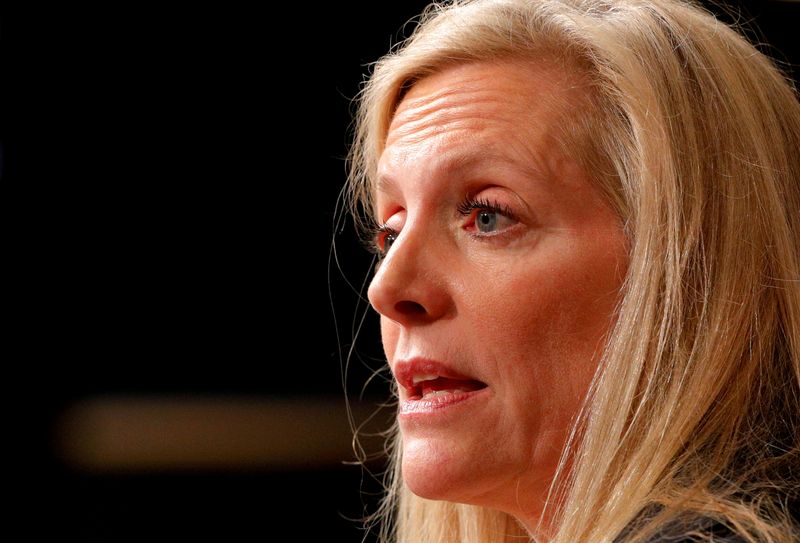(Reuters) -Federal Reserve Vice Chair Lael Brainard's announced departure from the central bank next week to become one of President Joe Biden's top economic advisers leaves an intellectual and political hole at the Fed at a challenging time, with waning but high inflation, an uncomfortably tight job market, and uncertainty about a 'soft landing' for the economy.
The White House announced Brainard's appointment as director of the National Economic Council (NEC) on Tuesday, and the Fed said her resignation would become effective "on or about" Feb. 20.
Analysts and Fed observers are already swapping notes on potential replacements for Brainard at the Fed from a bench of economists aligned with Biden's Democrats, who control the U.S. Senate. The appointment requires Senate approval and it is unclear how soon the U.S. president will move to fill an important role traditionally held by economists with a PhD in the field.
Here are possible contenders, presented in alphabetical order:
SETH CARPENTER
Among the few names being tossed about with an extensive Wall Street background, Carpenter is currently a managing director and chief global economist at investment bank Morgan Stanley (NYSE:MS). With a PhD from Princeton University, he was a senior staff economist at the Fed for 15 years and also served at the Treasury Department during the Obama administration. His current banking industry affiliations may make him a hard sell to progressive Democrats.
LISA COOK
Cook, the first Black woman to serve on the Fed Board of Governors, is a newcomer who has not commented extensively on monetary policy since joining the central bank in May. With a PhD from the University of California, Berkeley, Cook served as a senior economist on the White House's Council of Economic Advisers (CEA) during the Obama administration. Prior to joining the Fed, she was an economics professor at Michigan State University.
MARY DALY
Daly is president of the San Francisco Fed, ascending to that position in 2018 after 22 years at the regional Fed bank, including a stint as its director of research. With a PhD from Syracuse University, her research has often focused on labor market dynamics and economic inequality.
KAREN DYNAN
Now an economics professor at Harvard University, where she earned her PhD, Dynan served as assistant secretary for economic policy and chief economist at the Treasury Department under former President Barack Obama. Dynan worked at the Fed's board for 17 years, including a leadership stint in macroeconomic forecasting. She is well regarded for her expertise on macroeconomics, consumer behavior and household finances.
JASON FURMAN
Like Dynan, Furman has a PhD from Harvard and is an economics professor there. He chaired the CEA under Obama from 2013 to 2017. Furman has been a prominent, Twitter-savvy commentator on macroeconomic and Fed policy. He chided the Fed for being too slow in raising interest rates once it became apparent that surging inflation was no longer transitory, and has been cautious about the idea of the Fed easing off on its stringent monetary policy too soon. That could raise the hackles of progressive Democrats already concerned that Brainard's departure might leave the central bank too willing to risk damaging the U.S. job market if inflation does not abate.
AUSTAN GOOLSBEE
Goolsbee, who has a PhD from the Massachusetts Institute of Technology, took over as president of the Chicago Fed in January. Like Brainard, he has been vocal about the "two-sided risks" the Fed faces, a nod to the possible job-killing aspects of raising interest rates too quickly. He chaired the CEA under Obama from 2010 to 2011.
PHILIP JEFFERSON
Jefferson, the fourth Black man to serve as a Fed governor, has been on been at the central bank since last May and has not spoken extensively yet on monetary policy. He has a PhD from the University of Virginia and served as a Fed economist for a little over a year in the mid-1990s. Prior to his appointment to the Fed's board, he was vice president for academic affairs at Davidson College in North Carolina.
NELLIE LIANG
Liang, who has a PhD from the University of Maryland, is the Treasury Department's under secretary for domestic finance and worked at the Fed for 30 years. She was the first director of the central bank's Division of Financial Stability, which was created after the 2007-2009 financial crisis, and is regarded as a financial system expert. She was nominated to the Fed's board by former President Donald Trump, but ran into opposition from the banking industry, which considered her approach to regulation too strict. She eventually withdrew her name after the Senate failed to schedule a hearing.

JOHN WILLIAMS
Williams is president of the New York Fed, an influential role that includes being vice chair of the central bank's rate-setting Federal Open Market Committee and having the only permanent vote on monetary policy among the 12 regional Fed bank chiefs. With a PhD from Stanford University, he's held staff positions at the Fed board and the San Francisco Fed, where he also served as president before moving to the New York Fed role in 2018. Williams was also a senior economist at the CEA under former President Bill Clinton. He is a well known for his research, particularly on concepts like the neutral rate of interest.